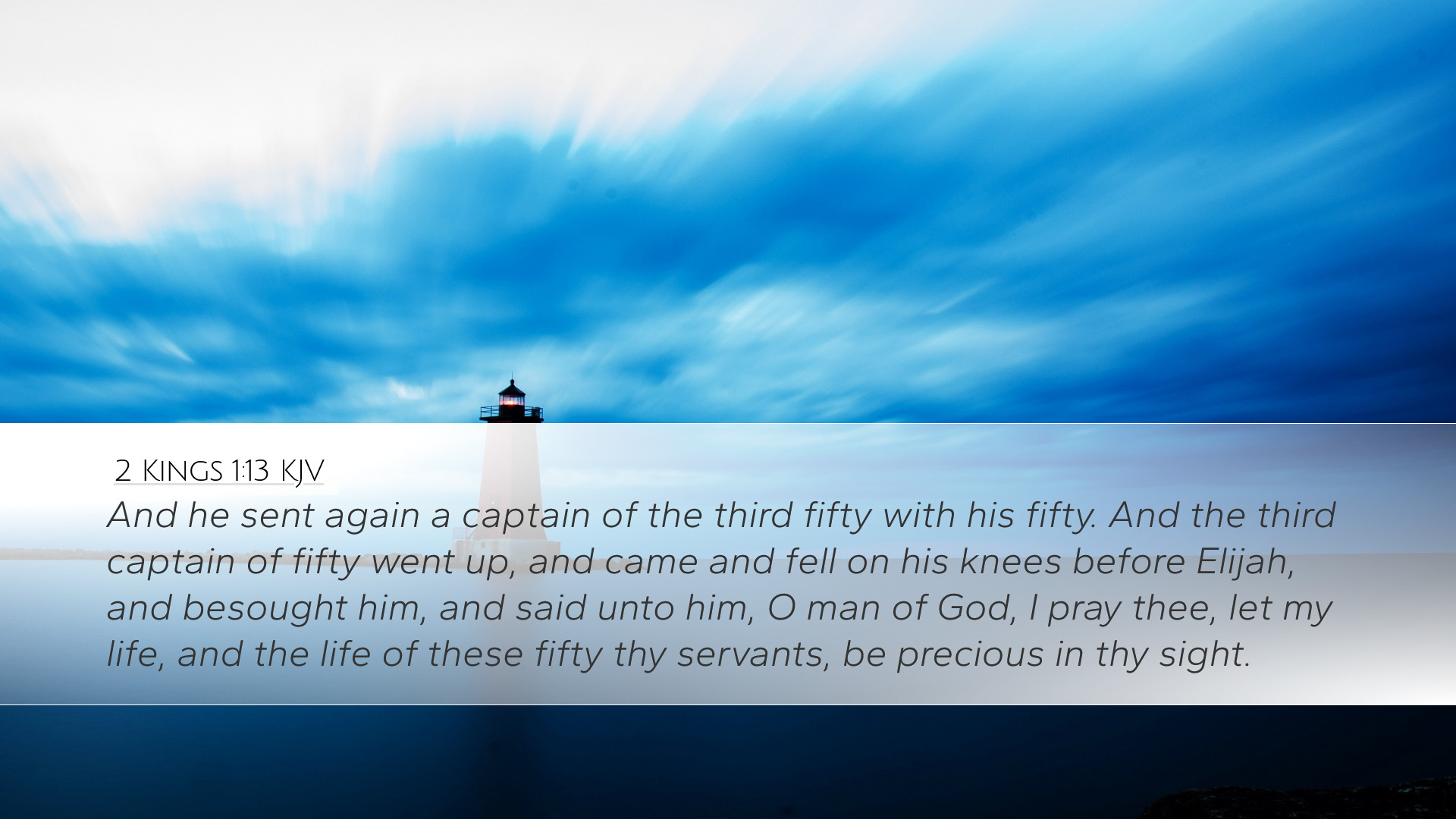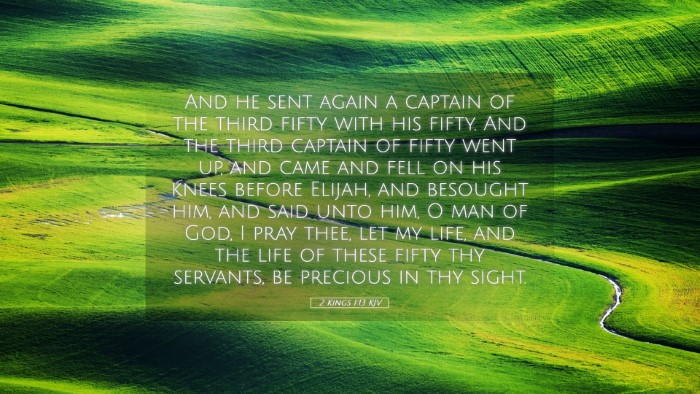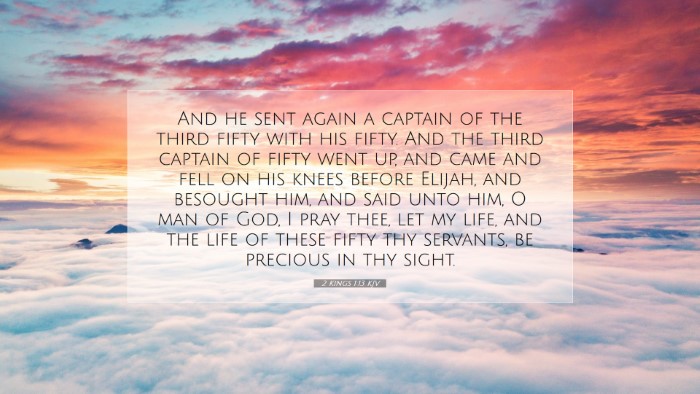Old Testament
Genesis Exodus Leviticus Numbers Deuteronomy Joshua Judges Ruth 1 Samuel 2 Samuel 1 Kings 2 Kings 1 Chronicles 2 Chronicles Ezra Nehemiah Esther Job Psalms Proverbs Ecclesiastes Song of Solomon Isaiah Jeremiah Lamentations Ezekiel Daniel Hosea Joel Amos Obadiah Jonah Micah Nahum Habakkuk Zephaniah Haggai Zechariah Malachi2 Kings 1:13
2 Kings 1:13 KJV
And he sent again a captain of the third fifty with his fifty. And the third captain of fifty went up, and came and fell on his knees before Elijah, and besought him, and said unto him, O man of God, I pray thee, let my life, and the life of these fifty thy servants, be precious in thy sight.
2 Kings 1:13 Bible Commentary
Commentary on 2 Kings 1:13
Verse (2 Kings 1:13): "And he sent again a captain of the third fifty with his fifty. And the third captain of fifty went up, and came and fell on his knees before Elijah, and besought him, and said unto him, O man of God, I pray thee, let my life, and the life of these fifty thy servants, be precious in thy sight."
Introduction
This verse encapsulates a critical moment in the narrative of 2 Kings, representing a turning point in the confrontation between the prophet Elijah and the authority of King Ahaziah. It portrays not only the dynamic of power but also illustrates the profound moral and spiritual lessons entwined within the biblical text.
The Context of the Narrative
In the preceding chapters, especially chapter 1 of 2 Kings, we see King Ahaziah of Israel seeking the counsel of Baal-Zebub, the god of Ekron, following his injury from a fall. This decision reflects his abandonment of the God of Israel and corresponds with a pattern seen throughout his reign and the reigns of his predecessors.
Insights from Public Domain Commentaries
Matthew Henry's Commentary
Matthew Henry highlights the significance of the three different captains sent by the king to summon Elijah. He notes that the first two captains approached the prophet with arrogance and disrespect, reflecting the prevailing attitude of those in power who believed they could command the authority of God. Their fate serves as a stark warning against pride and pretense in the face of divine authority.
Henry emphasizes that the third captain's humility and plea for mercy demonstrate a crucial turning point. His falling on his knees represents a recognition of Elijah's spiritual authority and God's power. This act of submission is a critical contrast to the previous captains, suggesting that true leadership recognizes the sovereignty of God and must come with humility.
Albert Barnes' Notes on the Bible
Albert Barnes provides a keen observation on the nature of submission illustrated in this verse. He notes that the third captain approaches Elijah not merely as a prophet but as a servant of God, acknowledging the prophet's power and authority. This acknowledgment was crucial for the captain, as he recognized that his previous companions had met with divine judgment.
Barnes also elaborates on the idea of intercession seen in the plea of the captain, which can be paralleled to the role of intercessors in the church today. He reflects on the importance of humility before God, noting that genuine requests for mercy should be rooted in reverence and acknowledgment of God's authority.
Adam Clarke's Commentary
Adam Clarke, in his commentary, delves into the character of the third captain, suggesting that his actions indicate a profound recognition of the power of God. Clarke posits that this captain’s change of heart may have been influenced by witnessing the consequences suffered by the first two captains. It underscores the principle that humility often arises from witnessing the seriousness of God’s judgments.
Clarke also points out that the phrase "let my life, and the life of these fifty thy servants, be precious in thy sight" encapsulates a fundamental truth about human life and worth in relation to God. He reflects on the value of life from a spiritual standpoint, highlighting that every life is precious and should be treated with dignity, particularly within the context of God's authority.
Theological Implications
- The Nature of Authority: The differing responses of the captains illustrate the tension between human authority and divine authority. The arrogance of the first two captains contrasts starkly with the humility of the third, which serves as a reminder that true authority comes from submission to God.
- The Role of Intercession: The petition for mercy spoken by the captain aligns closely with theological themes of intercession found throughout scripture, reflecting a need for mediators between God and humanity, culminating in the ultimate intercessor, Christ.
- Understanding Judgment: The swift judgment on the first two captains serves as a reminder of the severity of God's holiness. The attitude one brings before God can have dire consequences, inviting a self-examination among leaders regarding their posture before divine authority.
- Life's Value: The plea of the captain emphasizes the intrinsic value of human life, urging believers to recognize and honor life as a precious gift from God. This value is underscored further in the teachings of Christ, who also spoke about the worth of individuals and their relationship with God.
Conclusion
2 Kings 1:13 is more than a historical account; it is a rich narrative that speaks to the human condition and our relationship with God. The dynamics of authority, humility, and the value of life are woven throughout the interactions between Elijah and the captains. This profound moment encourages reflection on how we approach God, the importance of humility in our requests, and our understanding of the authority of the divine in our lives. For pastors, students, theologians, and scholars, this passage serves as a lens through which the character of God, human authority, and the nature of repentance and intercession can be explored.


